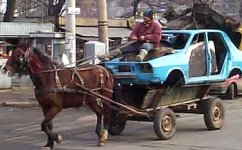<font color=blue>Diesels give torque at low rpm, modern engines give less torque but rev higher. A small, high revving engine with low torque can have the same HP as a high torque, low revving engine, but don't expect it to pull a plow at 540 rpm...</font color=blue>
Well, if you geared it down low enough (say, about one inch per hour forward speed) it might pull a plow, no? /w3tcompact/icons/smile.gif
Seriously, I keep coming back to the feeling that there is something fundamental in what I am missing here. When I feel that way, generally I try to go back to basics and start from the beginning ... hoping to spot where I'm going wrong. In this case, that approach may or may not work:
Let's say we start with the idea that a given amount of "energy" is needed to do a given amount of work. You can dole the energy out slowly, and accomplish the job slowly, or you can dole it out fast and get the job done quickly. But the amount of energy needed will be a constant. (Let's forget for the moment about incidental losses in the drivetrain, gears, and so on.)
Some jobs need to be done quickly, like drag racing.. while some other hypothetical job isn't time-critical (you leave for vacation and when you return it's completed.)
Hmm.. I think this isn't leading in a useful direction. All of the above is probably either obvious or simply incorrect. /w3tcompact/icons/smile.gif
Let's try again:
An engine needs to output energy in a way that's useful for the given application. For pulling stumps, all you need to do is find the right gearing and almost any engine can do it. For drag racing, you need to avoid the wasted time of shifting ... so what you want is an engine that can maintain its energy output over a wide RPM range.
Could it be that "horsepower" really reflects how wide this RPM range is for a given energy output? For example, if we need 50 foot pounds of torque, an engine that can generate this much between 3000 and 4000 RPM would be seen as having a lot less horsepower than one that can generate it between 1000 and 10000 RPM?
Okay, I've displayed enough ignorance for one post. /w3tcompact/icons/blush.gif
Thanks to everyone who's replied!
